College News
Friday
17
MAY
2024
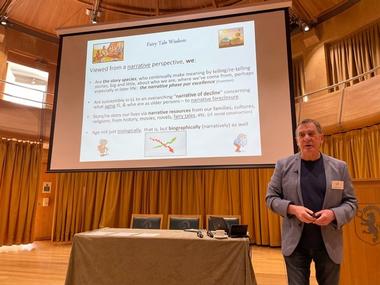
We were delighted to welcome the University of the Third Age's annual Ron Gray Conference to Emmanuel, where Ron was a fellow, as well as being a U3AC lecturer. Bill Randall, Lent Term 2024's Derek Brewer Visiting Fellow, organised the conference at the College, alongside the rest of the U3AC team.
Mark Sanderson (U3AC Council Member and Conference organiser) who is also an Emmanuel member, sent us this report of the fascinating work that the U3AC undertook during their day here: "We were very lucky to have Professor Bill Randall, Emeritus Professor of Gerontology, from St Thomas University, Canada, join us as he was a visiting fellow at Emmanuel College. Bill put together a day of talks and workshops on the subject of narrative gerontology.
Bill gave the opening talk on exploring the insights into our lives, our selves, and our relationships that can be accessed by reflecting on fables, fairy tales, and other little stories, that we first encountered as children but that, for various reasons, have stayed in our minds ever since. Such stories allow us to frame our lives and draw comparisons from.
The members then rotated around three workshops. Oddgeir Synnes, Professor of Health Humanities, VID Specialized University, Oslo, Norway, gave us a workshop as an introduction to creative writing in later life based on the speaker’s vast experience from giving courses in creative writing for older adults in various settings. The workshop aimed to engage members through various exercises of creative writing to give an increased understanding of what the method might have to offer.
Karen Skerrett, Clinical psychologist, from University of Chicago and Northwestern University showed how telling stories shape the way we see and react to the world. While some life stories promote a positive, fulfilling life, others undermine well-being. Creating a better story for life, one characterized by a sense of purpose, meaning, caring relationships with others, and wisdom lead to a better quality of life.
David Amigoni, Professor of Victorian Literature and Director of Keele Institute of Social Inclusion, Keele University, was joined by Brenda Hennessey, Jacky Carter, and Steve Bambury from Ages and Stages Theatre Company based at the New Vic Theatre, Newcastle-under-Lyme. The workshop encouraged members to use theatrical techniques to explore body and spoken languages. The workshop had everyone working collectively ‘in the round’ (in a circle) and in breakout groups. The aim was to stimulate members’ creativity, mental flexibility and thinking skills by using improvisation scenarios.
The day finished with a panel discussion where presenters took questions from the floor.
I would like to thank Bill and his colleagues for presenting on the day. Thanks to Emmanuel College for hosting us, and thanks to all those members who joined us."
Monday
29
APR
2024
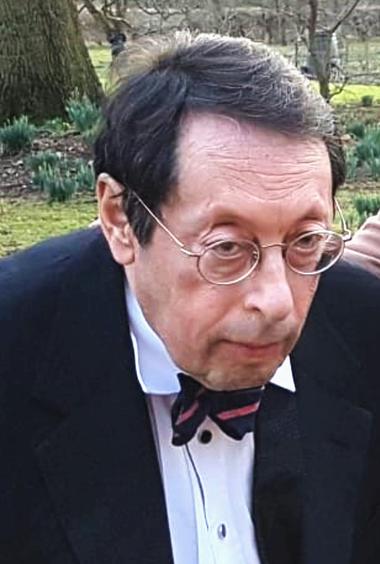
The college is sad to announce that our Bye-Fellow Jack Lang died on Tuesday 23 April after a long illness.
Jack matriculated in 1966 and had been, at various times, our Director of Studies in Computer Science and in Management Studies. He was appointed a Bye-Fellow in 2003.
Jack was a serial entrepreneur and business angel. Interested in ‘computer science and how the brain works’, his undergraduate degree in Mechanical Sciences led to a Computer Science diploma and a spell as Demonstrator in the Computer Laboratory. He left the University to found, with Professor Shon Ffowcs-Williams, the consulting company TopExpress, one of whose projects was designing some of the software for the BBC Microcomputer.
Jack also founded Electronic Share Information Ltd, which was acquired by E*Trade Inc in 1995, and was a founder of Netchannel Ltd, which was acquired in 1998 by ntl, for whom he subsequently became Chief Technologist. He was also co-founder of Raspberry Pi in 2012, which achieved its aim of putting high-performance, low-cost, general-purpose computing platforms in the hands of enthusiasts and engineers all over the world. Over 60 million computers have been sold in the last decade and the Raspberry Pi Foundation enables young people to realise their full potential through the power of computing and digital technologies. Jack was one of the most significant figures in computing education in the UK.
He was author of ‘The High Tech Entrepreneurs Handbook’ (2002) and taught courses in Business Studies, Entrepreneurship and Ecommerce for the University of Cambridge Computer Science Laboratory. He was Entrepreneur in Residence at the Centre for Entrepreneurial Learning at the Judge Business School.
Jack was a keen sourdough baker, a passionate cook and a caring owner of a very productive apple orchard. A side project was as founder (and sometime chef) of Midsummer House Restaurant, Cambridge's only Michelin starred restaurant. And in keeping with his polymath nature, having mastered the art of designing and making fireworks at a relatively young age, he also became the architect of, and long-term champion for, the Cambridge fireworks display.
He will be much missed and long remembered by many around the world.
Monday
4
MAR
2024
.jpg)
Each term, Emmanuel welcomes Visiting Fellows to the College from across academic disciplines to work with Fellows, enjoy college life and explore interdisciplinary connections across our community.
This Lent Term, we’ve been delighted to welcome Professor Bill Randall, who studied with us in 1976, as Derek Brewer Visiting Fellow. He is Emeritus Professor of Gerontology at St Thomas’ University in Fredericton, New Brunswick, Canada, where he has helped to pioneer a unique field of study known as “narrative gerontology”. His research and writing explore the complexity of biographical (vs biological) ageing, changes in autobiographical memory over the lifespan, and the nature of narrative resilience in later life..
His conference (March 19-20, 2024) explores the theme of later life as a journey of consciously growing old instead of passively getting old; as a time of discovery and not just decline. It will explore the possibility of changing the narrative of later life from the sad, slow tragedy in terms of which it is often perceived to, instead, an adventure, one which can lead in a variety of directions (outward, backward, inward, forward). The overarching aim of the event is to foster conversation concerning – and in a sense to test out – such a counter-intuitive vision.
Topics to be discussed include learning, spirituality, and creativity in later life; the role of gender and culture in shaping ageing; ageing and civic engagement; and the place of literature, theatre and poetry in fostering continued development, even amid dementia and at the end of life. While speakers will represent a range of disciplines including psychology, sociology, religious studies, literature, medicine and psychotherapy, the event is geared not only to researchers or practitioners but also to older adults themselves.
Wednesday
14
FEB
2024
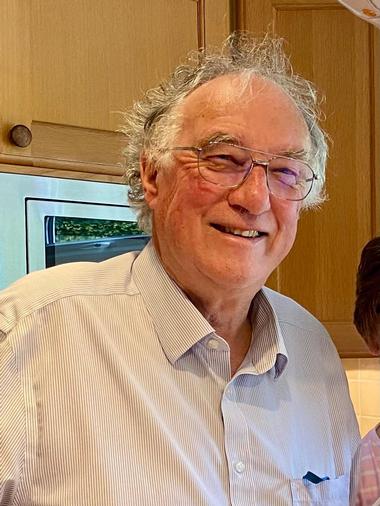
The College is sad to announce that our Life Fellow Professor Christopher Burgoyne died suddenly on 2 January in Addenbrookes. A book of condolence will be available in the Chapel. If you can't sign the book in person, you can leave a message of remembrance online, to be included with the physical book.
To generations of Engineers at Emma, Chris was very much a father-figure combining compassion with clearly expressed expectations. Talking to any engineering student in the last 30 years, Chris was central to all aspects of their Cambridge experience. His particular research interest was concrete structures, an area in which he was an acknowledged expert. Anyone who interacted with Chris was instantly aware of his love of concrete in all its forms, ranging from Coventry Cathedral to Hammersmith Flyover. This structural expertise was also directly applied within College to the awarding-winning Queen’s Building, and the recent development of Young’s Court.
He joined Emmanuel College in 1989 as an Official Fellow and College Lecturer in Engineering. He was the long-time Director of Studies in Engineering. His knowledge and direct advice made him a valuable member of College Council and many other committees. Though in his own words no sportsman, Chris was involved in both the CU Swimming and Water Polo Club, and also the CU Life-Saving Club.
He will be deeply missed and long remembered. Our thoughts and prayers are with his wife, Vanessa, and family as they come to terms with his unexpected death.
Thursday
11
JAN
2024
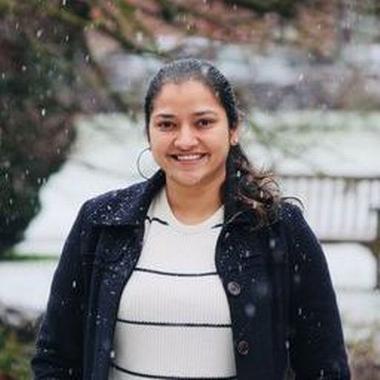
We're absolutely delighted that our former John Henry Coates Fellow, Dr Pallavi Singh, has been awarded the Society for Experimental Biology's Plant Section President Medal, for her research into water use strategies in crop plants. The medal will be awarded at this year's SEB conference in Prague in July.
The Society for Experimental Biology brings together and supports the international community of experimental biologists, and we're so proud of Pallavi for this award! Her work while she was with us contributed to marking conceptual advancement in understanding the evolution of C4 photosynthesis. She's now lecturing at the University of Essex, and we can't wait to see her continued work towards her lab's goal of developing more water-efficient crops and promoting climate-smart agriculture.
Tuesday
19
DEC
2023
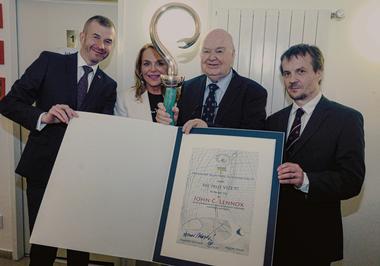
We are delighted that our alumnus, Professor John Lennox (1962), has been awarded the VIZE 97 Prize for 2023, becoming this year's Laureate of the Dagmar and Václav Havel Foundation. The Prize was given to him for an unmissable contribution to the public debate on the role of religion in contemporary civilization.
Prof Lennox received a diploma and the sceptre of St Vojt?ch, by the Czech artist Ji?í Plieštik. He chaired a debate and panel discussion on the subject of Science and Religion, the engagement and study of which he was awarded the Prize.
The Board of the VIZE 97 Prize project said: ‘Professor Lennox becomes this year’s laureate of the VIZE 97 Prize not because of his research in the mathematical field, in which he naturally excels, but above all because of the engagement he shows in the discussion of religion and its influence on modern science. It helps us, the lay public, to become familiar with the issues that the debate about the relationship between faith and science necessarily brings up and which are important, non-obvious, difficult and yet timeless and at the same time extremely topical.’
Professor Lennox is also Emeritus Professor of Mathematics and an Associate Fellow at the Saïd Business School, University of Oxford.
Monday
18
DEC
2023
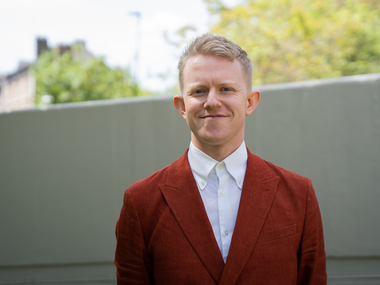
At the Emmanuel Society’s AGM, we were delighted that Harry Hickmore (2011) was appointed as the Society’s new Chairman. Harry read music and musicology at Emma, and now works as the Development Director at the Orchestra of the Age of Enlightenment.
Over the last ten years, the Emmanuel Society has met under the Chairmanship of Nicholas Allen (1990). Nick has been a charismatic, reliable and conscientious support to the Society and the College’s membership. After a decade of dedicated service, and 21 as a member of the committee, Nick has decided the time has come to pass the torch.
On his appointment, Harry said: ‘Emma’s lasting appeal is why I am so thrilled to become the Chairman of the Emmanuel Society. Its 10,000-strong global community plays a crucial role in the life of the College and its dedicated committee members have, since the Society was founded decades ago, provided a year-round programme of events around the world that enable members to keep in touch with College goings-on, catch up with old friends and meet new people from the Emma community. Since graduating – some years ago now! – I have been constantly impressed by how the College constantly evolves. As it does, so too does the Society. I’m interested to hear from members about what they may like the Society to offer in future. Please do get in touch.’
Reflecting on his tenure, Nick said: ‘For most of us, our time at Emma is such a formative part of our lives, and so it is important this relationship is maintained and fostered after graduation. The Society plays an important role in this, giving members the opportunity continually to renew that relationship in a myriad of ways (intellectual, cultural, social etc), and mix with members across the generations. It’s also important the Society continues to evolve, both in what it offers members by way of opportunities and by working alongside the College in initiatives such as Emma Experience. The Society, and its committee, also looks and feels very different now to the one I joined 21 years ago – it has evolved to meet the needs of members and the College – and I’m sure the same will be the case 21 years from now.’
Monday
11
DEC
2023
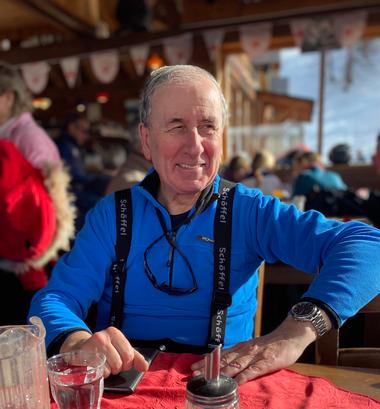
We are very sad to announce that Professor Robert Henderson died peacefully at home early on Sunday 10 December after a short illness.
Within the University he had been a mainstay of the Pharmacology Department, acting as their Head on several occasions. More recently he had earnt a reputation for calmness and diligence, University wide, for the way he chaired its COVID ‘Gold’ Committee.
He joined Emmanuel in 1993 as an Official Fellow and College Lecturer in Medicine. He was a dedicated and devoted Fellow, a wise counsellor and friend to us all. He held many roles, including as Tutor, Financial Tutor, Admissions Tutor, Acting Senior Tutor and, since 2011, as our Senior Tutor, a position which he only stepped down from a fortnight ago. He then became a Life Fellow. At various times he was also Fellows’ Steward and editor of the college website. He will be deeply missed and long remembered.
Tuesday
28
NOV
2023

The College community are absolutely thrilled that our Fellow in International Relations, Professor Ayse Zarakol, has been awarded the Rahmi M. Koç Medal of Science for her outstanding work at the intersection of historical sociology and international relations. She is the first recipient of the Medal in the International Relations discipline, and received her award in Istanbul at Koç University.
Her work retheorises of sovereignty, order and decline from a more global perspective. Her most recent book 'Beyond the West' investigates the grand narrative of (Eur)Asia as a space connected by overlapping successive world orders originating from the Mongol Empire. It also uses that history to rethink the foundational concepts of international relations, such as order and decline. This publication has won over 5 'best book' awards, including the 2023 Allan Sharlin Award from the Social Science History Association, and the 2023 International Studies Association Northeast Conference Yale H. Ferguson Award.
Wednesday
22
NOV
2023

"The building in which we are gathered tonight was once the bed of a sea. It’s constructed, like other parts of the college including the Queens Building, from a Middle Jurassic oolitic limestone called Ketton Stone".
So begins Professor Robert Macfarlane's sermon at our recent Commemoration of Benefactors. Read his full sermon below, on the radical perspective that is deep-time, and the legacies of being good ancestors like our forebears.
Tuesday
21
NOV
2023
Friday
27
OCT
2023
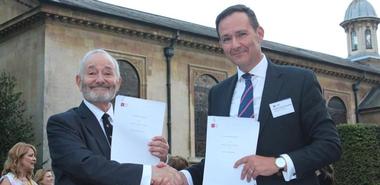
The College are delighted to partner with First Star to support care experienced children in Cambridgeshire with their education and pastoral needs. They will be offered mentoring and will be able to visit the College on Saturdays for extra tuition in English and Maths plus extra-curricular activities, in addition to a new summer school next year.
Thursday
14
SEP
2023
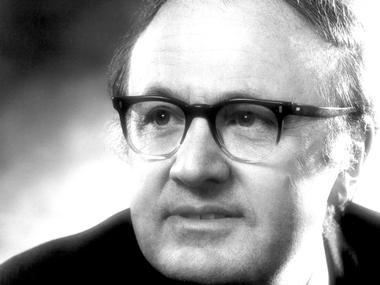
The College is greatly saddened that our Life Fellow, Professor Brian Thrush FRS, has recently passed away, in the comfort of his home. The funeral will take place at 11am on Monday 16 October in the College Chapel. All are welcome; the Funeral Addresses are available.
Prof Thrush, who matriculated in 1946, had been a dedicated Fellow since 1960 and contributed significantly to the college community, taking on various important roles including Tutor, Wine Steward, Vice-Master and Acting Master.
Tuesday
5
SEP
2023
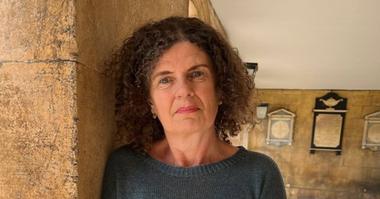
We're thrilled that our Fellow, Professor Clare Pettitt, has been awarded the prestigious Rose Mary Crawshay Prize for her remarkable book, 'Serial Forms: The Unfinished Project of Modernity, 1815-1848.'
Clare's work delves into the fascinating world of 19th-century urban life and the transformative power of rapid information. Her book has received accolades from judges and has won both the North American Victorian Studies Association (NAVSA) Book Prize, and the European Society for Periodicals Research (ESPRit) Book Prize.

